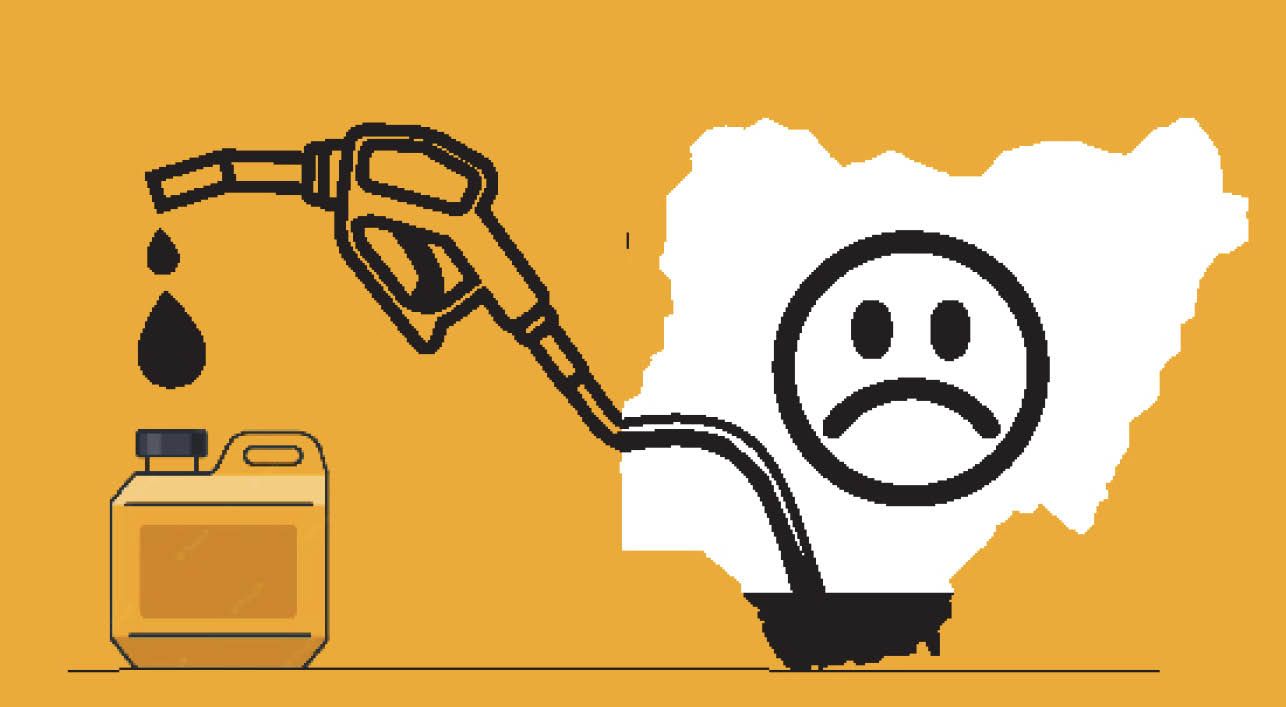Yes, petrol scarcity is back again as if it were a bad coin. The only devilish trend that could probably surpass perennial petrol scarcity or the stretched-out queues occasioned by the scarcity is corruption; another evil that has almost become intractable in Nigeria. Except for the honey-moon years (2015-2018) of President Muhammadu Buhari’s first term in office as elected civilian president, petrol scarcity has, for most part of the Nigeria’s nationhood as an oil producing and exporting country, remained one of the worse recurring decimals. Given how sharp practices have deeply bedevilled Nigeria’s petroleum industry over the years, scarcity of products has more often than not been caused by artificial forces.
Pump prices even at filling stations owned by major marketers have become so irregular. They keep changing frequently; leaving motorists at the mercy of oil marketers. This is even as government lays claim to paying trillions of naira in the name of subsidy. Ironically, officials of the Nigerian National petroleum Corporation Limited (NNPCL) and oil marketers yet have separate excuses to advance in defence of themselves each time Nigerians are subjected to untold hardships arising from short supply of products.
The respite of uninterrupted supply of petrol particularly in Abuja and Lagos experienced by Nigerians during the last Christmas and New Year seasons only happened by the grace of the stern warning handed down late last year to all stakeholders by the Department of State Services (DSS). Worried by the sufferings to which petrol scarcity exposed Nigerians to for most part of the year, the secret police in the early part of December 2022 issued a 48-hour ultimatum to the NNPCL and all categories of marketers to end the lingering fuel crisis in the country; adding that it was prepared to deal with defaulters.
The petrol queues that swiftly disappeared after the threat issued by the DSS unfortunately returned again to all filling stations in Abuja and other parts of the country where petrol always sold at exorbitant pump prices. One wonders why oil, which is God-endowed and a resource that should supposedly be a blessing to the country, has rather become a source of misfortunes for most citizens. Corrupt practices at retail outlets of the NNPCL such as bribery, touting, diversion of the product to black marketers have continued to compound and worsen fuel scarcity in Nigeria.
Reports in the media indicate that few pumps are put into use at most filling stations with a deliberate intent to create long queues, and as a consequence, compel impatient motorists to pay gate keepers in order to shunt the long queues. Others who cannot endure the fatigue of staying on long queues go to black marketers or roadside retailers who sell the product above official pump price. These infractions carried out by product racketeers consequently unleash hardships on Nigerian motorists. Unemployed young people who hawk the product in plastic containers of 5 litres or 10 litres continue to make brisk businesses for as long as petrol scarcity lasts. To them, this abnormal situation as a source of daily bread; and therefore, should not cease.
The adversities that come along with scarcity of petroleum products are many. The health and wellbeing of citizens are endangered. The economy also suffers in many ways. Productive manhours are wasted on queues. It triggers increase in transport fares and fuels inflation generally. Consequently, it kills small businesses and overstrains poor Nigerian with burdens greater than they have the financial capacity to bear. Are we not by our own actions as government regulatory agencies or marketers or retailers not converting oil from the blessing, which God intended it to be, into a curse for Nigerians?
In an attempt to respond to Nigerians’ cry over the lingering fuel crisis, President Muhammadu Buhari on Tuesday January 24, 2023 approved the constitution of a 14-man steering committee to enforce petroleum products supply and compliance at official pump price. While President Buhari will personally chair the steering committee, the Minister of State for Petroleum Resources, Chief Timipre Sylva will serve as the alternate chairman. Other members of the committee are the Minister of Finance, Budget and National Planning; Permanent Secretary, Ministry of Petroleum Resources; National Economic Adviser to the President; Director-General of the DSS; Comptroller-General of the Nigeria Custom Service; Chairman of the Economic and Financial Crimes Commission (EFCC); and the Commandant-General, Nigerian Security and Civil Defence Corps (NSCDC). The rest of the members are the CEO of the NMDPRA; Governor of the Central Bank of Nigeria (CBN); the Group CEO of the NNPCL; Special Advisor (Special Duties) to the Minister of State for Petroleum. The Minister of State’s Technical Advisor (Midstream) will serve as Secretary of the Committee.
The committee’s terms of reference according to a statement issued by the Senior Adviser (Media & Communications) to the Minister of State for Petroleum, Horatius Egua, the president directed NMDPRA to ensure strict compliance with the government’s approved ex-depot and retail prices for petrol. The committee is also expected to guarantee national strategic stock management, visibility on the NNPCL refineries rehabilitation and track daily distribution to tackle smuggling. NNPCL, which is the sole supplier, is further required to meet the domestic supply obligation of petrol and other petroleum products in the country. Buhari as the Minister of Petroleum Resources and Chairman of the Committee further directed that the interests of the ordinary Nigerian be protected from price exploitation on other deregulated products such as diesel, kerosene and cooking gas.
The presidential committee under reference is, in a way, a mockery of Buhari as minister of petroleum. The membership of other public officers on the committee equally sounds ridiculous. Except for the DSS, if all members of the committee had done all that was required of them by their public offices, there wouldn’t have been any need for this committee. Without any prejudices, if the sector under the watch of this set of people was allowed to be engrossed in the unceasing crisis of petrol scarcity we find it today, what difference would the bringing of the same people together in one committee to do the same work they hitherto failed to perform make? As optimists, it would be our collective joy if the committee is able to change the decades-old aberrations in Nigerians oil industry. May Allah save Nigerians from the wicked plots of covert and overt economic saboteurs, amin.

 Join Daily Trust WhatsApp Community For Quick Access To News and Happenings Around You.
Join Daily Trust WhatsApp Community For Quick Access To News and Happenings Around You.


